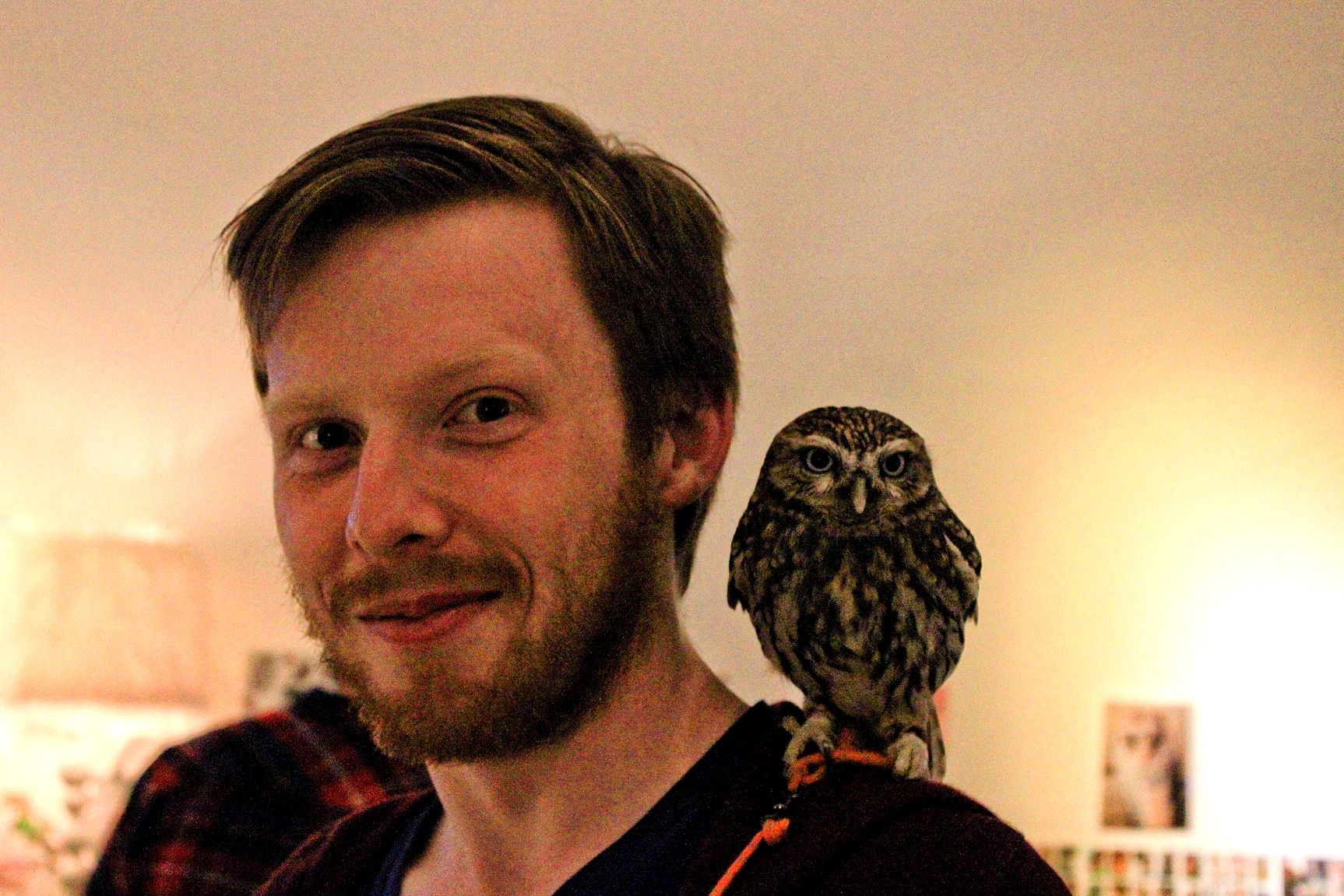Join Our Bubble: A Review of White Man Behind A Desk Live
Adam Goodall attends the opening night of White Man Behind A Desk Live, watches Andrew Little get torn apart and considers what the show gains - and loses - in the move from YouTube to Circa.
Adam Goodall attends the opening night of White Man Behind A Desk Live, watches Andrew Little get torn apart and considers what the show gains - and loses - in the move from YouTube to Circa.
On Tuesday night, I watched one of New Zealand’s few Youtube sensations roast Leader of the Opposition Andrew Little so thoroughly that I momentarily forgot I was watching a comedy show.
Little was the special guest for White Man Behind A Desk Live’s opening night at Circa Theatre, and it was clear from the first monologue that this wasn’t going to be the harmless 7 Days-style ribbing that he might have expected. Robbie Nicol, the titular white man, asked an audience member for a number between 10 and 20 and got the number 15. “15’s immigration,” Nicol nodded, the kind of nod you do when you need to convince yourself that what’s about to happen is both cool and good. “Sorry, Andrew.”
For the next ten minutes, Nicol tore into the bipartisan dogwhistling about how immigrants were responsible for our stratospheric house prices and overburdened national infrastructure. He held an unflattering light up to the hypocrisy, racism and exploitation at the heart of Pākehā New Zealand’s relationship with immigration. Then he invited Little to join him onstage. “You said immigrants were responsible for our overcrowded hospitals,” Nicol asked, “but can you see how, when the evidence doesn’t say that, the way you frame that issue can be read as cynical?” Little bumbled through his response – strange, when you think about it, given the role he’s played in making immigration an election issue.
Robbie Nicol and Elsie and Sally Bollinger have been producing punchy Youtube monologues under the White Man Behind A Desk title since 2015. Each video is a metaphor-heavy crash-course on a social or political issue that you might know something about but you probably don’t have all the facts on. They’re well-researched and well-attributed, but more importantly they’re well-structured; there’s a formula that makes them more accessible and more entertaining. Almost without exception, Nicol starts off believing in the conventional wisdom on an issue. Nicol, talking at a hundred miles an hour, is baffled by the mountain of evidence that piles up around him. Then he peaks with a realisation, a rousing, earnest take-away delivered with absolute conviction.
White Man Behind A Desk's best monologues are more than just a good structure, clever jokes and manic energy. They’re not just funny or strongly-felt. They’re cathartic.
Nicol’s a clear and charming communicator of facts and policy, sure, but he’s also a wonderfully rubbery performer. Moreso than his inspirations – Stewart and Oliver and Colbert – Nicol doesn’t just feel like a man behind a desk, ranting at a world gone mad. He jerks across it, leans out to you, swallows the room in his broad smile. His desk is there to hold him back. It contains his colossal amounts of energy. That’s even more obvious on the wide Circa Two stage.
So Live, written by Nicol and Finnius Teppett (My Dad’s Boy) and directed by Stella Reid (Orphans), breaks from the template and drops us behind the scenes. It’s a bit Larry Sanders, a bit Hudson and Halls Live. Nicol’s sole guide is his First AD (Teppett), an alien in human skin. He talks in a monotone and emphasises how important it is that we give them “human laughter...We need you to laugh loudly, but not sarcastically”. He’s no motivator, though, and when the camera stops rolling, Nicol pulls his elbows in and talks in a wobbly voice lower and slower than his usual breakneck patter. He’s less the flipside of Colbert and more the flipside of Alan Partridge, rigid with anxiety where Partridge shook with ego.
Our white man behind a desk is collapsing under the combined weight of his mission and his medium, not to mention an interviewee who hasn’t turned up, and Reid, Nicol and Teppett have off-kilter fun with that crisis. In a bouncy opening number, Nicol sings the praises of living in a liberal bubble because the world’s too chaotic for even a PolSci major to understand. Later, the First AD keeps forcing Nicol to change the format of his interview with Little on the fly. Nicol jumps from washy breakfast television (“How are you feeling? Right now? Do you like interviews?”) to a sober Espiner-and-Fergusson grilling, to a Project-style goof-off complete with Pictionary, a whistle-stop tour through New Zealand legacy media’s current identity crisis.
The show within the show is full of funny and weird setpieces and Nicol is playful with both the audience and an increasingly-uncomfortable Little. When Nicol asks Little to draw ‘Malcolm in the Middle’ on an easel, Little takes up the pen. But Little’s blocking is poor and the audience can’t see his stick figures. Nicol politely brings it to his attention, not missing a beat: “Andrew, you’re kind of ignoring the people on the left!”
There’s something weirdly anxious and demoralised about the show around the show, though. With the show falling apart around him, Nicol loses faith in his own ability to actually connect with the audience. His First AD offers no help, stressing to us that no matter what we cannot talk to the star: “He says he wants notes but we don’t have time for the tears.” By the end of the cacophonous, looney tunes finale, the show’s a write-off, Nicol’s despondent and all we can do is take selfies with him.
That’s a strange note to end Live on, because it’s at odds with what works best about WMBAD online. Its best monologues are more than just a good structure, clever jokes and manic energy. They’re not just funny or strongly-felt. They’re cathartic. They shout down the liars, the cheaters and the hate-merchants. They stand up for the vulnerable. Like Jon Stewart in the Bush years, they make you feel heard. They make you feel like you’re not the only one who’s really seeing what’s going on. Even the videos on subjects as depressing and all-encompassing as climate change end on something resembling optimism, a note that suggests that we’re all in this together that that’s worth something.
The immigration monologue near the start of the show – delivered with force and compassion, without condescension or mugging, right at the Leader of the Opposition – is cathartic. The subsequent interview with Little, bold and uncompromising, is cathartic. Nicol’s later monologue about the rise of the ‘alt-right’, as clear and uncomplicated a précis of its origins as one could hope for, is cathartic too. Nicol calls on us to keep the faith, asks that we never stop caring about each other. After all, if we stop caring, those dickheads get what they want. These moments are cathartic. But they’re moments, and they disappear – pretty much all before the panicked, distressed final fifteen minutes.
Live feels like a product of its time, that time being right now. Nicol, Teppett and Reid have effectively channelled the grim and dizzying uncertainty of being a young person in today’s political climate, bombarded on all sides by unsolvable problems that you’re hopelessly unequipped to even speak to, let alone solve. That means that Live is often frantic and hilarious, but that also means that Live ends up weirdly depressing and defeated. But there are parts that light a little fire in your heart, parts that make you want to fight another day. Maybe it’s because Nicol and his team are as baffled as they are fired up, shaken by how the world’s chipped away at their own – our own – conventional wisdom. Maybe it’s because they haven’t quite found the rousing, earnest take-away yet. I’m still not sure if they need to.
White Man Behind A Desk Live runs from Tuesday 6 to Saturday 10 June at
Circa Theatre, Wellington. Book here.
White Man Behind a Desk Live also runs from August 29 - September 2 at Q Theatre with a range of new guests. Book here.
Header photo by Sally Bollinger.


